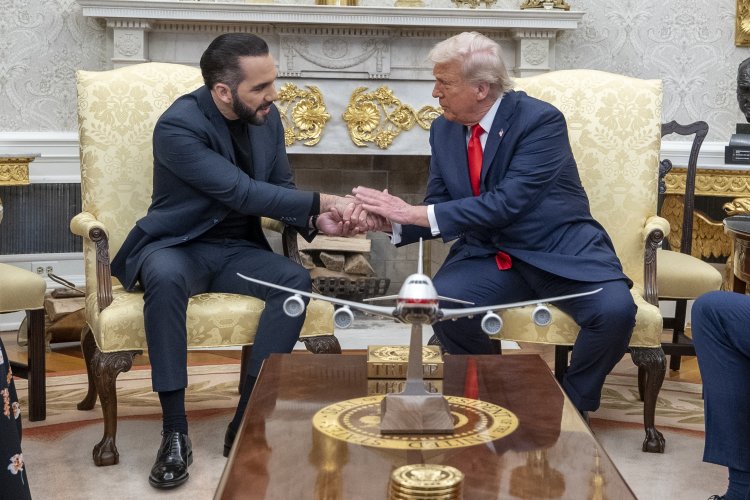Trump's Preferred Authoritarian Ally Aids Him in Circumventing Court Decisions
El Salvador's President Nayib Bukele is calling on Trump to adopt his authoritarian approach.

While Trump has long admired foreign autocrats, El Salvador President Nayib Bukele’s regime represents a testing ground for Trump 2.0. Bukele refers to himself as the “world’s coolest dictator.” Trump declared himself a potential dictator on Day 1. Furthermore, he has utilized or considered many of the same tactics Bukele has employed to cement his power: removing judges, intimidating political foes, sidestepping due process, and evading term limits.
Currently, Bukele is assisting Trump in evading court orders in the United States.
During a recent White House visit, where the two leaders exchanged friendly banter, Bukele made one thing clear: he will not release Kilmar Abrego Garcia, a Salvadoran native who was living in Maryland before the U.S. illegally deported him last month. This declaration allows Trump to claim he is powerless to carry out a judge’s directive requiring the U.S. to “facilitate” Abrego Garcia's immediate return from a brutal prison in El Salvador. The Supreme Court affirmed that directive last week.
Trump’s assertion of “nothing I can do here” is atypical for a president known for pressuring other global leaders to comply with his demands. It heightens tensions with the judiciary ahead of a crucial Tuesday hearing involving U.S. District Judge Paula Xinis, who mandated Abrego Garcia’s return and is expressing growing frustration at the administration's defiance.
Following Bukele’s White House visit, the Trump administration referenced some of his comments in a regular report that Xinis has requested. Additionally, the acting general counsel at the Department of Homeland Security, Joseph Mazzara, noted that “DHS does not have authority to forcibly extract an alien from the domestic custody of a foreign sovereign nation.” However, the filing lacked responses to Xinis’ key questions.
The emerging alliance between Trump and Bukele extends beyond Abrego Garcia. Recently, Trump sent hundreds of additional deportees to El Salvador, many without due process. On Monday, he escalated threats of unlawful deportations, speculating on sending U.S. citizens to Salvadoran prisons.
“If it’s a homegrown criminal, I have no problem,” Trump stated, mentioning that he’s directed his aides to explore the legality of transferring Americans abroad to complete prison sentences.
U.S. law prohibits the deportation or denial of entry to American citizens, and no legal framework exists that permits a prisoner to be sent to another country against their will to serve a sentence imposed by an American court.
"Sending U.S. citizens to another country’s prison that has significant human rights concerns and does not meet our constitutional standards for conditions is illegal," declared Lauren-Brooke Eisen, senior director of the Justice Program at the Brennan Center for Justice. “It would also violate the First Step Act, which President Trump signed in 2018 and mandates that the federal government place people in ‘a facility as close as practicable to the prisoner’s primary residence, and to the extent practicable, in a facility within 500 driving miles of that residence.’”
Even without the expulsion of U.S. citizens, Trump has been pushing the limits of his legal authority to deport foreign nationals without due process. He has invoked the Alien Enemies Act of 1798, a rarely utilized wartime power, to send hundreds of Venezuelans and other foreign nationals he deems terrorists or gang members to Bukele’s government. Salvadoran officials quickly confined these individuals in the large detention facility known as the Terrorism Confinement Center, often filmed in the process.
However, Trump’s summary deportations have been fraught with errors that raise concerns about whether the administration is wrongfully sending individuals into harsh conditions without the protections afforded by the U.S. Constitution. The Justice Department has acknowledged in court that Abrego Garcia was deported in violation of a 2019 order from an immigration judge who determined he could not be sent back due to the risk of persecution by local gangs. Trump’s immigration and Justice Department officials have referred to this deportation as an “administrative error.”
Yet, White House adviser Stephen Miller contradicted this claim on Monday.
“He was not mistakenly sent to El Salvador,” Miller asserted on Fox News, stating, “This was the right person sent to the right place.”
Despite the conflicting statements from Trump’s administration, Bukele added to the confusion on Monday by asserting that he too lacks the ability to return wrongly deported individuals held in El Salvador.
“How can I smuggle a terrorist into the United States?” Bukele questioned regarding Abrego Garcia. “I don’t have the power to return him to the United States.”
The rhetoric from both leaders creates a remarkable catch-22: both the American and Salvadoran governments claim they lack the authority to address what multiple judges have identified as a significant error.
Xinis, an Obama appointee in Maryland, is one of those judges. She expressed how what occurred with Abrego Garcia, “shocks the conscience.” A follow-up hearing is scheduled for Tuesday afternoon as lawyers for Abrego Garcia seek to have Trump administration officials held in contempt for not adhering to her orders.
Trump provided various justifications on Monday for his admiration of El Salvador’s prison system, including financial savings for the U.S. and greater security than American facilities. However, he appeared particularly drawn to the imagery of prisoners being roughly handled, having their heads shaved, and being placed in large group cells.
Before the press corps entered the room, Trump quietly discussed sending Americans there with Bukele.
“The homegrowns are next,” Trump was captured saying on a live video stream released by Bukele’s office. “You got to build about five more places.”
“Yeah, we've got space," Bukele replied, eliciting laughter from U.S. officials present.
Trump praised the professionally edited, Hollywood-style videos Bukele has produced showcasing the prison transfers of U.S. deportees.
“I’ll tell you who’s good: whoever sends us those tapes that you get. They become sensations in this country,” Trump remarked. “Getting out of those planes, that’s what people want to see: Respect, they want to see respect. … Whoever does that does a great job.”
He even likened the videos to classic films by Cecil B. DeMille.
Homeland Security Secretary Kristi Noem, who visited the Salvadoran prison and posted a social-media video in front of one of the group cells, underscored the propaganda value of the operation.
“It’s been a powerful message of consequences,” she stated. “This is a clear consequence for the worst of the worst.”
Bukele has skillfully aligned himself with key figures in Trump’s MAGA base to bolster his rapport with the president. He regularly interacts with and reposts content from Elon Musk, former congressman Matt Gaetz, and right-leaning journalists on social media who favorably cover deportation efforts.
Bukele has also utilized social media to boast about assisting Trump in circumventing U.S. court orders. When a judge mandated that planes carrying Venezuelan deportees either return or bring those prisoners back to the U.S., Bukele tweeted a cheeky response: “Oopsie…too late,” followed by a tears of joy emoji.
Publicly, Bukele suggested in February that he was open to taking American-citizen prisoners, stating on X that his country was prepared to help the U.S. “outsource part of its prison system … in exchange for a fee.”
“The fee would be relatively low for the U.S. but significant for us, making our entire prison system sustainable,” he explained.
While violent crime in the U.S. is currently at or near record lows, Bukele continues to present the nation as overwhelmed with crime, explicitly stating Monday that the U.S. should take cues from El Salvador, which now boasts the highest per capita incarceration rate in the world.
“You have 350 million people to liberate. To liberate 350 million people, you have to imprison some,” Bukele stated. “We’re very eager to help. … We know that you have a crime problem, a terrorism problem that you need help with. And we’re a small country but, if we can help, we will do it.”
Max Fischer for TROIB News












